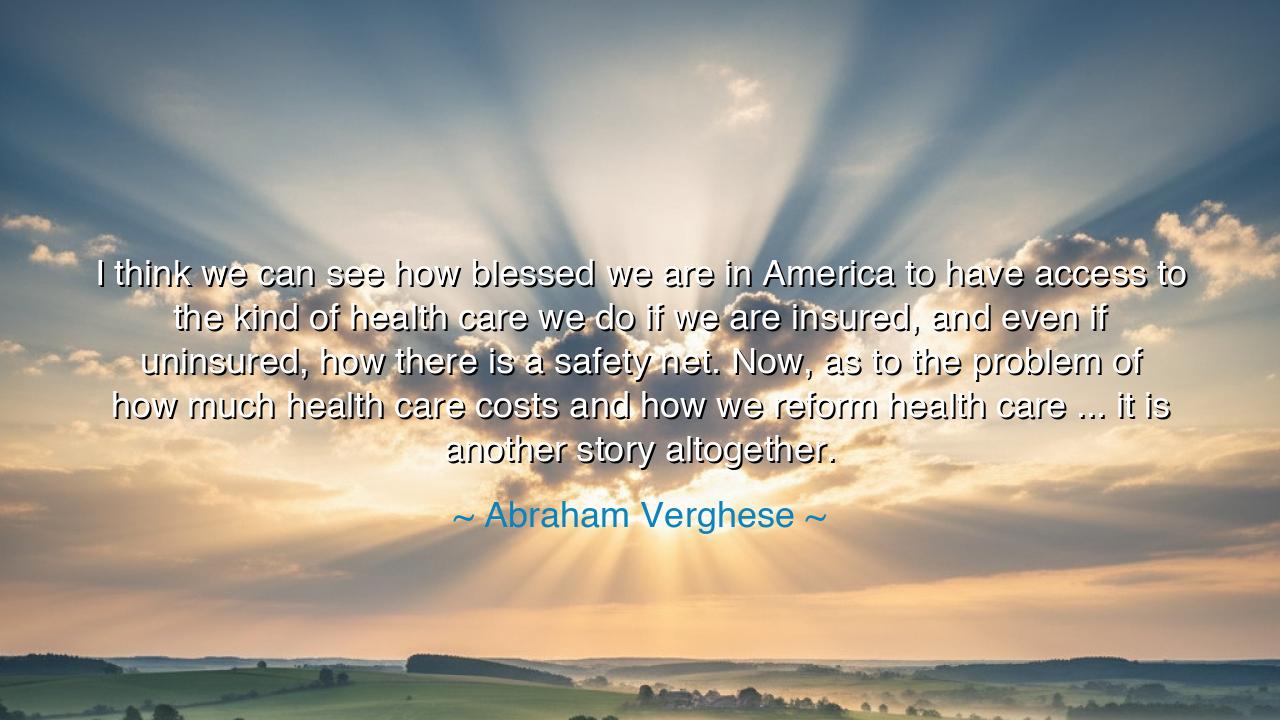
I think we can see how blessed we are in America to have access
I think we can see how blessed we are in America to have access to the kind of health care we do if we are insured, and even if uninsured, how there is a safety net. Now, as to the problem of how much health care costs and how we reform health care ... it is another story altogether.






“I think we can see how blessed we are in America to have access to the kind of health care we do if we are insured, and even if uninsured, how there is a safety net. Now, as to the problem of how much health care costs and how we reform health care ... it is another story altogether.” — Abraham Verghese
Hear now the voice of Abraham Verghese, healer, writer, and witness to the frailty and glory of humankind. In these words, he speaks not merely of medicine, but of gratitude and burden, of blessing and imperfection, joined together in the same vessel. He reminds us that the story of health care is both miracle and sorrow — a system that saves, yet strains; that comforts, yet costs. He speaks as one who has seen both sides of the bed: the physician’s struggle to heal, and the patient’s longing to be healed. His words are not of complaint, but of reflection — a measured voice in an age of anger, teaching us to give thanks even amid imperfection.
In ancient times, the art of healing was a sacred calling, not a marketplace. The Greeks honored Asclepius, whose temples were filled with hope, not bills; whose followers healed through wisdom and touch. Yet even then, Verghese’s truth held sway: medicine was always a mixture of grace and grief. For health — like all blessings — is never equally shared, and even the most advanced societies wrestle with the same question: how to care for all without crushing the few. Thus his words echo through the ages: that the gift of care is a wonder, but its cost and reform remain “another story altogether.”
In his lifetime, Verghese saw the blessings of modern medicine — machines that breathe for the dying, drugs that conquer infection, surgeries that restore sight and life. Yet he also saw the inequality that shadowed this progress. In his novels and teachings, he often tells of the human spirit within medicine — the nurse who holds a trembling hand, the doctor who sits beside the hopeless, the system that, despite all its flaws, still catches those who fall. His acknowledgment of the safety net is not naïve praise, but a recognition that even amidst bureaucracy and cost, compassion still flickers. It is the divine remnant in a human institution.
Think of Dr. Verghese’s own story, born in Ethiopia, trained across continents, a pilgrim of healing. He came to America not merely for opportunity, but for the chance to serve in a land where science and mercy intertwine. During the height of the AIDS crisis, when many fled in fear, he went toward the suffering, tending to the dying with the reverence of a priest. In that moment, he saw what America’s health care, for all its flaws, still possessed — the will to care, even when medicine could not cure. His gratitude was born not from wealth or efficiency, but from witnessing human kindness within imperfection.
And yet, his final words strike with quiet thunder: “how much health care costs and how we reform health care ... it is another story altogether.” Here he touches the ancient tension between ideal and reality, between what ought to be and what is. The republic of medicine, like the republic of man, is built on noble laws but hindered by selfishness and greed. The cost of care becomes not only a financial burden but a moral one. To reform it, Verghese implies, we must look beyond money and politics — into the deeper heart of compassion, where medicine’s true spirit lies.
The lesson, then, is twofold: to be grateful for what we have, and yet restless for what we can improve. Gratitude without effort leads to complacency; reform without gratitude leads to bitterness. We must walk between the two — thankful for the safety net, yet determined to weave it stronger; grateful for the system, yet bold enough to heal it. Every citizen, like every physician, bears this duty: to see the sacred in the flawed, and to labor for its renewal.
So, my children of the future, take these words to heart. When you behold the hospital and its gleaming lights, give thanks for the science that saves. But when you hear the cries of those who cannot afford its care, do not turn away. For the true health of a nation lies not in its machines, but in its mercy; not in its wealth, but in its willingness to heal one another. As Verghese reminds us, we are blessed, yes — but the story of healing is never finished. It is written anew each day, in every act of compassion, every voice that rises for justice, and every heart that refuses to stop caring.






AAdministratorAdministrator
Welcome, honored guests. Please leave a comment, we will respond soon